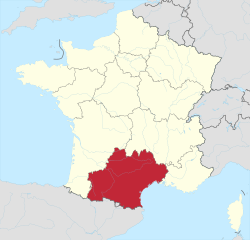Occitania (administrative region)
| Occitanie | |
|---|---|
| Region of France | |
 |
|
| Country |
|
| Prefecture | Toulouse |
| Departments | |
| Government | |
| • President | Carole Delga (Socialist Party) |
| Area | |
| • Total | 72,724 km2 (28,079 sq mi) |
| Population (2012) | |
| • Total | 5,626,858 |
| • Density | 77/km2 (200/sq mi) |
| Time zone | CET (UTC+1) |
| • Summer (DST) | CEST (UTC+2) |
Occitanie (French: [ɔksitani]; Occitan: Occitània, Catalan: Occitània) is an administrative region of France that was created on 1 January 2016 from former French regions Languedoc-Roussillon and Midi-Pyrénées. France's Conseil d'État approved Occitanie as the new name of the region on 28 September 2016, effective 30 September 2016.
The new Région Occitanie should not be confused with the wider cultural entity of Occitania, of which the new administrative region is part.
The new region covers an area of more than 72,724 km2 (28,079 sq mi) with a population of 5,626,858.
As the provisional name of the new region, the text of the law specified the hyphenated names of the region's predecessors, Languedoc-Roussillon and Midi-Pyrénées, in alphabetical order. As for most of the merged regions, a permanent name was proposed by the new regional council;. The new name, Occitanie, comes from the historical name of the broader region, which refers to the historic use of the Occitan language and its various dialects in the region, named for the use of the word òc as the equivalent of "yes."
Enacted in 2014, the territorial reform of the regions has been subject to debate for many years. On 24 June 2016, the regional assembly of Languedoc-Roussillon-Midi-Pyrénées adopted Occitanie after a lengthy public consultation, which corresponds to the name of the historical region that included most of the new region's territory. The provisional name of the region was withdrawn on 30 September 2016, when the new name of the region took effect.
...
Wikipedia
